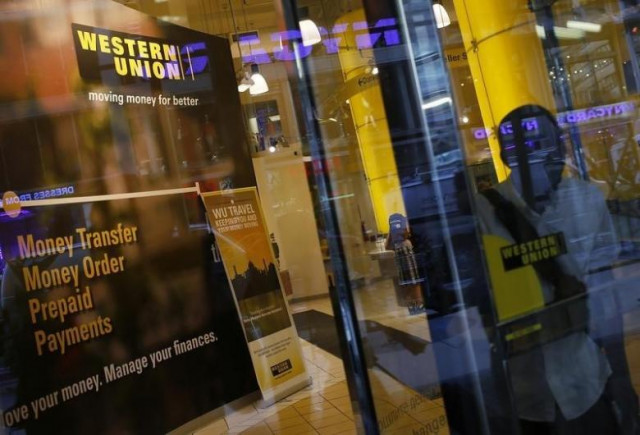Slowdown in remittances, exports add to economic woes
Current account deficit expected to widen, will add pressure on foreign exchange reserves, says brokerage house

A person walks out of a Western Union branch in New York. PHOTO: REUTERS
Historically, healthy support has been received from growing remittances almost covering the entire trade deficit (from FY11-16 remittances were 98% of trade deficit).
Pakistan, UK firms join hands to offer digital remittance services
“This coverage declined to 72% in fiscal year 2017, thereby increasing the Current Account Deficit,” Arif Habib Limited said in a recently-launched report on Pakistan’s economy.
Trade deficit grew by 40% year-on-year with imports up 18% and exports down by 1% in FY17. Higher imports under machinery and petroleum group were primarily responsible for the increase in trade deficit.
Textile exports, which contribute around 55% to total outbound shipments, have declined in 4 out of the past 5 years. “Key reasons for this performance have remained lack of availability and expensive power supply, structural inefficiencies and a relatively stable currency against greenback,” it said.
Besides, the current account deficit is expected to widen due to higher Chinese investment under multibillion dollar CPEC projects. The government, however, will finance it through additional borrowing from various sources including multilateral institutions, commercial banks, bond issuances and project loans.
The SBP had successfully managed to build foreign exchange reserves to a record high of $24.03 billion until October 2016. Since then, reserves have come down to $20 billion due to repayment and servicing of external debt and a higher CAD.
To deal with the situation, the brokerage house said, the country does not need to devalue its currency as devaluation will not increase its exports and immediately improve its foreign exchange reserves. However, the country needs to focus on cushioning its exports to regain competitiveness.
Remittances down 7% in April
Rebate has been announced for exporters to promote exports. Additionally, the government has imposed regulatory duty on imported goods including mobile phones, vehicles, auto mobiles parts, cosmetic and some non-essential products to curb imports.
Interest rates are expected to remain stable till March 2018, in its view. Going forward, there will be a slight increase in interest rates as inflation is expected to move up amid rising international commodity prices.
It said Pakistan will easily surpass the GDP growth target for 2018 as the manufacturing sector makes a comeback on the back of significant increase in power supply.
Inflation for FY18 is expected to remain around 4.4% as strengthening international prices for oil will have a direct and indirect impact on inflation, it added.
Published in The Express Tribune, October 29th, 2017.
Like Business on Facebook, follow @TribuneBiz on Twitter to stay informed and join in the conversation.


















COMMENTS
Comments are moderated and generally will be posted if they are on-topic and not abusive.
For more information, please see our Comments FAQ